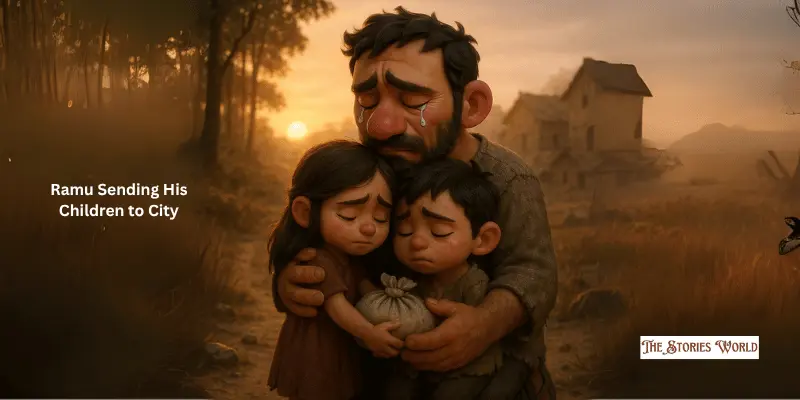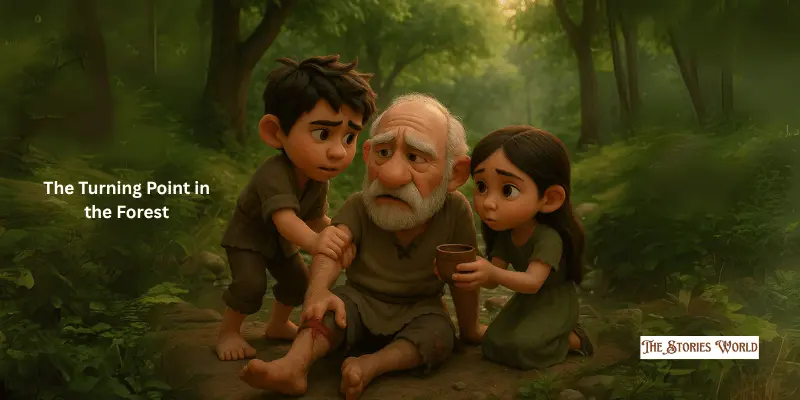Every Cloud Has a Silver Lining Story – The Poor Father Story
Updated: 25 Jun, 2025
244
The Every Cloud Has a Silver Lining Story is essentially inspired by the proverb ‘Every cloud has a silver lining.’ We all go through tough times in life.
Sometimes, everything feels dark and nothing seems to go right. But there’s a beautiful saying: “Every cloud has a silver lining.”
It means that even in the worst situations, something good can still happen. We must be patient and continue to believe.
This is an inspirational village story of a poor tailor named Ramu who faced hardship, made sacrifices, and showed kindness, even when life seemed unfair.
His journey reminds us that sometimes, unexpected blessings come when we least expect them.
Let’s read this moral story with a message of hope, strength, and the magic of never giving up.
Every Cloud Has a Silver Lining Story – Let’s Read

Ramu was a kind-hearted man who lived in a small village that had seen better days. He worked as a tailor, stitching clothes with love and care.
But life hadn’t been easy for him. Years ago, he lost his wife, and since then, he has been raising his two children—Meera and Karan—all by himself.
He lived in a tiny mud house at the edge of the village. His sewing machine, old and rusty, sat in the corner of a dim little shop.
Every day, he hoped for a customer. But ever since the drought hit the village, people had stopped spending money.
No crops, no festivals, no stitching work. His income was gone.
Ramu was a struggling father, doing his best to keep his family together. He often skipped meals so his children could eat.
At night, while the children slept, he would sit alone and wonder how long he could survive with just a few coins in his pocket.
This was the life of a poor village man, filled with love for his children, but weighed down by financial difficulties and a heart full of worries.
More Moral Stories
Hard Times Knock on the Door
One morning, Ramu opened his shop and sat silently, staring at the road.
His sewing machine hadn’t made a sound in days. The village was dry, the fields cracked, and the air heavy with dust. The drought had left everyone helpless, and Ramu was no different.
His children, Meera and Karan, peeked into the shop and sat beside him.
“Baba,” Meera whispered, “will we eat tonight?”
Ramu smiled faintly, hiding the pain in his eyes.
“Of course, my child,” he replied softly, “your baba will find a way.”
But deep inside, he didn’t know how.
That evening, Ramu counted the coins in his small wooden box — only six rupees remained. Not enough for even one full meal. He looked at the empty rice pot and felt his heart sink.
“Maybe I should go to the city and work, Baba,” said Karan. “I’m old enough.”
Ramu looked at his son. He was only ten.
“No,” Ramu said firmly. “This is not your burden. It’s mine.”
The nights grew longer and the days harder. With no stitching orders, no savings left, and children going hungry, Ramu felt broken.
The pain of financial difficulty, the fear of being unable to provide, and the loneliness of being a struggling father began to weigh on him.
One night, as he sat near the dim lamp, he made a decision—one that tore his heart.
“Maybe if I send Meera and Karan to the city, they’ll at least survive. They’ll find food… and maybe someone kind enough to help them.”
His hands trembled as he thought of letting go of his children. But he had no choice. The village had nothing more to give.
This was no longer just a poor village man’s story—it had become a test of love, sacrifice, and impossible choices.
A Heartbreaking Decision
The next morning, Ramu woke up early. He hadn’t slept much that night. The thought of sending his children away had kept him awake.
But the hunger in their eyes… that was even more painful.
He quietly packed a small cloth bundle—some dry rotis, a bottle of water, and two old shirts.
When Meera and Karan woke up, they noticed the sadness on their father’s face.
“Where are we going, Baba?” Karan asked, holding his hand.
Ramu took a deep breath, holding back tears.
“To the city, my children,” he said softly. “There’s work there. People who might help. You’ll be safer there… you’ll eat.”
“But what about you?” Meera whispered, her eyes filled with fear.
Ramu knelt down, hugging them both tightly.
“I’m your father. I can live with hunger. But I can’t see you suffer,” he said, his voice trembling.
“This is my sacrifice for my family, my children. One day, you’ll understand.”
With heavy steps, they began the walk through the forest path that led to the city. The sun was just rising, but Ramu’s world felt dark. Every step felt like a goodbye.
At the edge of the village, he stopped.
“Promise me you’ll stay together. Take care of each other,” he said.
“We will, Baba. We’ll come back when things get better,” Karan said bravely, even though tears rolled down his cheeks.
They hugged one last time — a long, tight embrace that said a thousand words. And then, with watery eyes, Ramu watched his children walk away into the forest trail, holding each other’s hands.
This was not just a story. This was the truth of many lives. A tale of tough choices in life, a real-life inspiration, and a father’s love that gave up everything so his children might survive.
The Turning Point in the Forest

Meera and Karan walked through the forest path, holding hands tightly. Birds chirped softly in the trees, but their hearts were heavy with sadness.
They missed their father already, and the road ahead felt scary and unknown.
Just as they reached a narrow curve near a stream, they heard a faint cry.
“Help… someone, please…”
Startled, Karan looked around and spotted an old man lying near the edge of a muddy slope. His leg was stuck between rocks, and he was clearly in pain.
“Meera, we can’t leave him like this!” Karan said, rushing toward him.
The two children worked together, pulling away branches and helping the man out carefully. He was weak and injured, but their kindness and quick thinking saved him.
“Thank you… Both of you,” the man said, holding their hands. “You’re just children… but you have the hearts of angels.”
They helped him sit on a rock and offered him their last bit of water.
“Why are you alone in the forest?” he asked.
Meera explained everything—about the drought, their father’s struggles, and their journey to the city in search of work.
The old man’s eyes softened. He was deeply touched.
“I am Dr. Raghav,” he said. “I used to be the village doctor before I retired. I was returning to my old home nearby… I slipped and fell.”
He paused and looked at them with gentle eyes.
“Your kindness saved my life. And now… maybe I can change yours.”
What seemed like just another sad day turned out to be the start of something unexpected. This was the turning point—a moment of fate, where their kindness led to a reward they never imagined.
The children didn’t know it yet, but their good deed would become the silver lining in the cloud of their pain.
The Silver Lining Revealed
Dr. Raghav, deeply moved by the children’s compassion, gently held their hands and said:
“Let’s go to my home. It’s not far from here. You need rest—and so do I.”
He took them to a small but well-kept house nestled near the edge of the forest. His caretakers quickly brought warm food, clean clothes, and a soft place for the children to rest.
Meanwhile, he sent a message to the village, asking someone to find Ramu.
When Ramu arrived, breathless and anxious, he saw his children safe and smiling.
“Baba!” Meera cried, running into his arms.
Ramu hugged them tightly, tears falling freely. He turned to Dr. Raghav.
“Thank you, sir. I have no words…”
Dr. Raghav smiled warmly.
“Your children helped me without knowing who I was. They saved me. And now, I want to help your family.”
He offered Ramu a tailoring space in his old storeroom, which he converted into a small shop. He gave the children the opportunity to study in the nearby school and provided the family with food, shelter, and safety.
Slowly, Ramu’s sewing machine began to hum again. Customers started coming. His hands stitched clothes, but his heart stitched hope. The house echoed with laughter once more.
This was the moment Ramu had prayed for—his silver lining after the storm. The unexpected blessing that came from his children’s kindness and his own sacrifice.
What once seemed like the end became a beautiful new beginning.
A Lesson for All
Ramu’s story reminds us that even when life feels dark and hopeless, something good is always waiting. Sometimes, the path to happiness begins with a single kind act, a difficult decision, or a little courage to keep going.
He was just a poor tailor in a forgotten village. But his sacrifice for family, his children’s kindness, and a stranger’s gratitude turned their lives around.
This is not just a tale—it’s a message for all of us:
Never lose hope. Every storm will pass. And behind every dark cloud, there really is a silver lining.
So the next time you’re going through a tough moment, remember Ramu’s story. Hold on. Keep faith because something beautiful might be waiting just around the corner.
What Kids Learn from This Story
- Always Be Kind: Meera and Karan helped a stranger in need—even when they were in trouble themselves. This teaches us that kindness can lead to unexpected rewards.
- Never Lose Hope: Ramu never gave up, even when life got really hard. The story shows that no matter how dark things seem, good days will come.
- Sacrifice Is a Sign of Love: Ramu was ready to give up his happiness for his children’s future. Kids learn that real love often means putting others first.
- Helping Others Brings Good Back: The children’s good deed brought blessings to their whole family. It teaches that doing the right thing always comes back in a good way.
- Stay Strong in Difficult Times: Even when we’re scared or sad, we must stay strong. Life presents challenges, but with patience and courage, things improve.
Follow-Up Questions for This Story
| Follow-Up Questions |
|---|
|
Please Write Your Comments